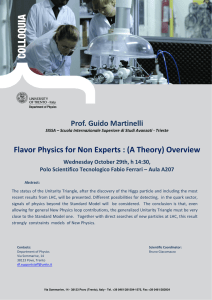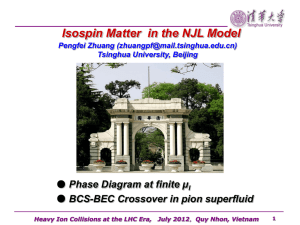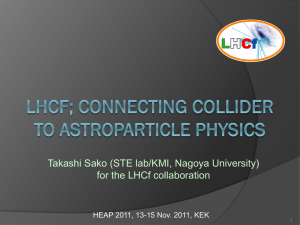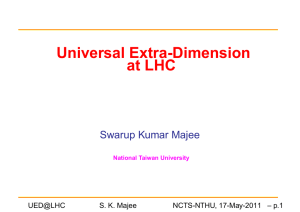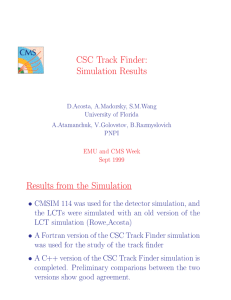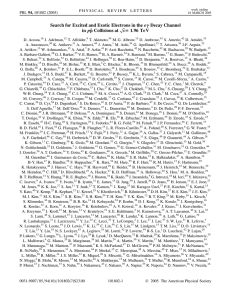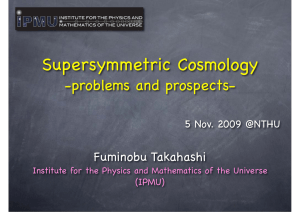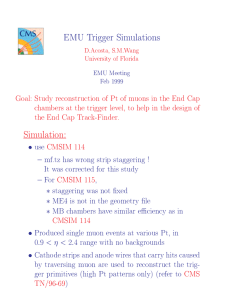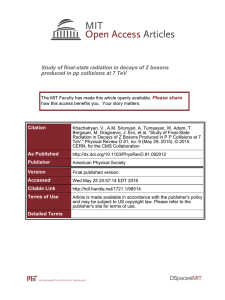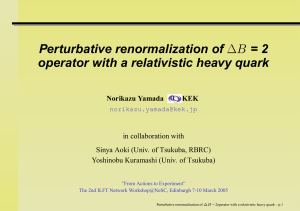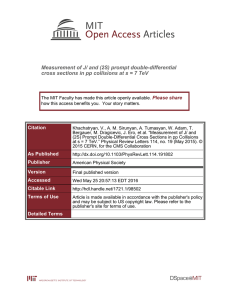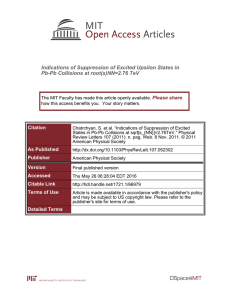Recent Results from ALICE
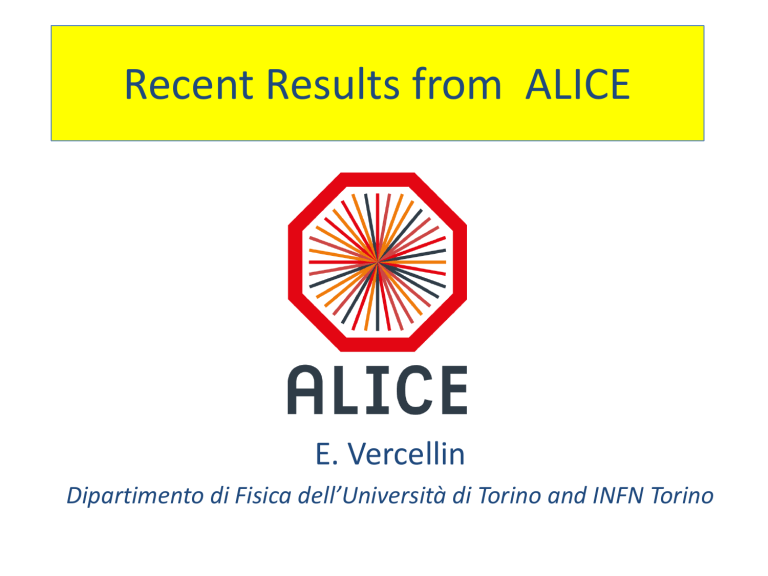
Recent Results from ALICE
E. Vercellin
Dipartimento di Fisica dell’Università di Torino and INFN Torino
Summary
• ALICE motivations, layout, data taking
• ALICE (Pb-Pb) results: a selection
– Global observables
– Anisotropic flow
– High-p
T particles and Jets
– Heavy Flavors
– Quarkonia
Based mainly on “fresh” results presented at the
Quark Matter conference, held in August 2012
• Conclusions and perspectives
2
MOTIVATIONS, DETECTOR LAYOUT
AND DATA TAKING
3
4
5
6
Heavy Ion Collisions
Create QGP by colliding ultra-relativistic heavy ions pre-equilibration
QGP
hadronisation
freeze out
Accellerators: AGS, SPS, RHIC, LHC
S
NN
(GeV) = 5.4 19 200 2360 (5200)
7
8
Observables
Jets
Open charm, beauty
9
• Diversi esperimenti, ciascuno mirato allo studio di diverse osservabili
10
11
12
LHC compared to SPS and RHIC
√s
NN
(GeV) dN ch
/dy t
0
QGP
(fm/c)
T/T c e
(GeV/fm 3 ) t
QGP
(fm/c) t f
(fm/c)
V f
(fm 3 )
SPS
17
500
1
1.1
3
≤2
~10 few 10 3
RHIC
200
850
0.2
1.9
5
2-4
20-30 few 10 4
The LHC is the ideal place to study the QGP: hotter - bigger -longer lived
~ 10 4 particles per event: Event by event physics
LHC
5500
1500-4000
0.1
3-4
15-60
≥10
30-40
Few 10 5
New or more important at LHC
Vanishing net baryon density (
B
0)
• Stronger thermal radiation (photons, dileptons)
• Longer QGP lifetime
Parton dynamics has an impact on fireball expansion
• High density (saturated) p.d.f. at small x (10 -5 )
impact on particle production
• Hard processes: jets and jet quenching
30 (3 10 -3 ) partons with E
• Heavy quarkonia: t
>10 GeV (100 GeV) in centr. Pb-Pb
Y family experimentally accessible, e high enough for melting?
• Heavy flavors abundant production
100 c-c bar and few b-b
J/ Y enhancement ?
bar in central Pb-Pb
Hard Probes, heavy quarks and quarkonia @ LHC
RHIC LHC
Pion Production
X 2000
Y production
R. Vogt, hep-ph/0205330
ALICE physics goal
Global observables:
Multiplicities,
distributions
Degrees of freedom as a function of T:
hadron ratios and spectra, dilepton continuum, direct photons
Early state manifestation of collective effects:
elliptic flow
Energy loss of partons in quark gluon plasma:
jet quenching, high pt spectra, open charm and open beauty
Study deconfinement:
charmonium and bottonium spectroscopy
Study chiral symmetry restoration:
neutral to charged ratios, resonance decays
Detect fluctuation phenomena - critical behavior:
event-by-event particle composition, spectra
Measure the geometry of the emitting source:
HBT, impact parameter via zero-degree energy flow
.. all the above measurements in a high-multiplicity environment!
17
Central Barrel
2 p tracking & PID
||
< 1
ALICE detector
ACORDE (cosmics)
VZERO scint. (centrality)
:
-1.7– -3.7, 2.8–5.1
T0 (timing)
ZDC (centrality)
FMD (N ch
-3.4<
PMD (N g
, N ch
)
<5)
18
Muon Spectrometer
-2.5 >
> -4
Detector:
Length: 26 meters
Height: 16 meters
Weight: 10,000 tons
Collaboration:
1200 Members
132 Institutes
36 countries
ALICE Acceptance
• central barrel -0.9 <
< 0.9
– 2 p tracking, PID (dE/dx, TOF, TRD)
– single arm RICH (HMPID)
– single arm PHOS
– jet calorimeter EMCal
• forward muon arm 2.4 <
< 4
– absorber, 3 Tm dipole magnet
10 tracking + 4 trigger chambers
• multiplicity -5.4 <
< 3
– including photon counting in PMD
• trigger & timing dets
– 6 Zero Degree Calorimeters
– T0: ring of quartz window PMT's
– V0: ring of scint. Paddles
µ arm
(charged particles)
Particle identification in ALICE
20
ALICE: main features and performance
ITS TPC
TOF
TRD
HMPID vertexing
Central Barrel
Forward det.
Muon Arm & C.B.
• particle identification (practically all known techniques)
• excellent vertexing capability
• efficient tracking – down to ~ 100 MeV/c
• particle detection over a large rapidity range
• quarkonia detection down to p
T
=0
21
Neutral mesons
Photon conversion
EMCal
PHOS
22
23
Identification of strange particles
Charmonium and D mesons
σ
J/Ψ
= (75 ± 3) MeV/c 2
D + →
Kpp
ALICE Data Taking
• Two heavy-ion runs at the LHC so far:
• in 2010 – commissioning and the first data taking
• in 2011 – (energy scaled) above nominal luminosity!
• pp data taken at different c.m. energies in 2009-2012:
• 0.9, 2.36, 2.76, 7 and 8 TeV
reference for HI data and genuine pp physics
• p-Pb run foreseen in Jan-Feb 2013 (pilot run Sept. 2012) year
2010
2011
2013 system
Pb – Pb
Pb – Pb p – Pb
26 energy √s
NN
TeV
2.76
2.76
5.02
integrated luminosity
~ 10
b -1
~ 0.1 nb -1
~ 30 nb -1
A couple of heavy-ion-specific aspects
CENTRALITY DETERMINATIONS AND
COULOMB INTERACTION
27
28
VZERO, SPD and ZDCs
VZERO
29
30
31
32
33
